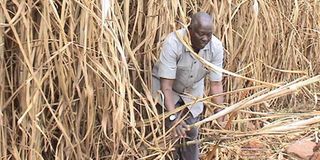Premium
Transmara residents give up nomadic life for sugarcane farming

Paul ole Tio, a sugarcane farmer, inspects his mature cane in his farm in Enoosaen, Transmara in Narok County. The construction of a sugar factory on the banks of River Sio in Busia County has been stopped by the National Environment Tribunal. PHOTO | RUTH MBULA | NATION MEDIA GROUP
What you need to know:
- The new sugarcane farmers say despite the problems bedevilling the sugar sector, they are hopeful that their new venture will yield maximum returns soon.
- The moran urges his fellow community members to adopt the new venture and practice it as an enterprise.
- Transmara Sugarcane Company CEO Rajesh Bhargava says that despite the gains made in sugarcane farming in Transmara, the government is to blame for most of the problems facing farmers.
- He expressed disappointment that the government had allowed cheap sugar imports from Comesa member countries who use Kenya as a dumping market.
Members of the Maasai community have for long be known as pastoralists, living the nomadic way of life.
However, the community is slowly giving up this way of life with each passing day.
In Transmara Sub-County for instance, the lush green fields that were once covered with grass for their animals are now giving way to huge sugarcane farms, signifying a shift in their way of living.
The new sugarcane farmers say despite the problems bedevilling the sugar sector, they are hopeful that their new venture will yield maximum returns soon.
One such farmer is Mr Joshua Lepara, a moran who is now growing the sweetener on his eight-acre farm.
"Sugarcane farming was introduced here four years ago. I have sustained my family, built rental houses and started several businesses despite a number of shortcomings in the enterprise," he says.
The moran urges his fellow community members to adopt the new venture and practice it as an enterprise.
He says land for rearing livestock has become scarce with a growing population hence the need to abandon old traditions that are slowly turning out to be non-beneficial.
Similar remarks were made by Mr Paul ole Tio.
The farmer, however, complained of ‘oppression’ by millers, who at times use faulty scales and overcharge them while transporting cane to their factories.
"It is only those in zone A, where farms surrounding Transmara Sugarcane Company at a radius of 5 kilometres benefit. Those in zone B, C and D are overcharged," Mr Tio says.
Kenya National Federation of Sugarcane Farmers Transmara branch Chairman Stephen ole Narupa says since they started sugarcane farming, the community has benefited tremendously.
"We have passable roads, clean water, loans and school fees for our children.
“We hope that if millers in conjunction with the government put the interests of farmers first, we will be assured of better lives,” he says.
VAT HURTING FARMERS
He, however, accuses the government of undermining the farmers saying the 16 percent VAT on sugar imposed by the government is hurting the sugar industry.
"Sugarcane farmers in northern Sudan are some of the richest people in Africa.
“This is because their government has their interest at heart. The spirit is the same for Malawian farmers,” Mr Narupa says.
Transmara Sugarcane Company Chief Executive Officer Rajesh Bhargava says that despite the gains made in sugarcane farming in Transmara, the government is to blame for most of the problems facing farmers.
"Government officials in cohort with sugar barons and officials in government owned sugarcane companies are working day and night to benefit from the industry at the expense of farmers and private millers," said Mr Bhargava.
"Already, giant sugar companies in western Kenya including Mumias Sugar Company are feeling the heat of this frustrations by the government," he added.
He expressed disappointment that the government had allowed cheap sugar imports from Comesa member countries who use Kenya as a dumping market for their cheap products.
He said the imports were affecting local farmers because cheap sugar floods the Kenyan market forcing millers to lower sugar prices for the locals.
"Farmers complain that we are oppressing them and we complain that the government is oppressing us," said the Transmara Sugar Company CEO.
He said farmers are the ones who bear the brunt of poor policies in the agriculture sector.
"We fear that the prices of a 50kg sugar bag could reduce to Sh2,600 down from Sh3,100.
“This is because there is a lot of sugar imported from Uganda and other neighbouring countries which reaches Kenya at very low cost of Sh2, 600,” he says.
Mr Bhargava said this could dilute all the gains made by sugarcane farmers especially in Transmara, where farmers have recently embraced sugarcane farming, as the prices will be too low for them.





